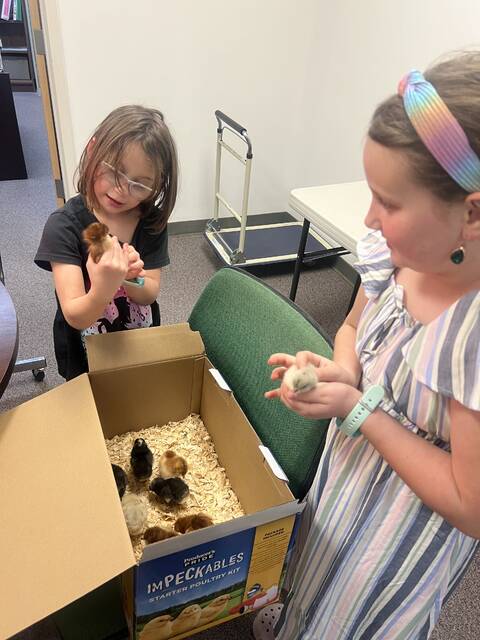As the weather begins to warm and the first flowers start peeking out of the ground, you can feel that Spring is just around the corner. With Spring comes spring chicks. Richmond County 4-H has jumped head on into several activities where our youth get hands-on learning experiences with chickens.
Already in full swing is this year’s 4-H Chicken Project. Through the Chicken Project, participants learn about the chicken life cycle, how chicks’ needs change as they grow from chick to adult, and how to properly show their adult chickens in competitions. Before receiving their chicks, participating families must attend a class to learn the ins and outs of being a “chicken tender”.
While the youth have the majority of the responsibility for taking care of their chickens, the 4-H Chicken Project is a family affair. Daily care is carried out by the child, with support from the parents if needed, but the whole family learns together how chickens grow, change and what it takes to care for another living creature. Participants are not only learning about a chicken’s life cycle and chicken care, but may be developing skills to better care for themselves as well. Studies by the National Institutes of Health have shown that caring for an animal can improve the responsibility and diligence a youth takes in caring for themselves. Owning an animal has also been shown to reduce stress, and as well as blood pressure.
By the end of the project, each participant will have created a Project Record Book. Throughout the project youth document their chicken tending efforts and what they have been learning. They will compile all this in something similar to a scrapbook. This is the Project Record Book. Through this, youth will learn documentation and organizational skills. At the completion of the Chicken Project, participants’ project record books will be sent to Raleigh where they are judged against other project record books from their district. Youth have the opportunity to win awards with a really outstanding project record book.
The Chicken Project culminates in the county Poultry Show held in June. Throughout the months between chick pick up and the Poultry Show, youth train and prepare their chickens to be shown. At the show, youth interact with judges and demonstrate not only the excellent care they put into their animals over the past several months, but the understanding of their chickens which they have developed throughout the project. This teaches showmanship, confidence in themselves and their ability to speak and present in front of others.
Along with the Chicken Project, Richmond County 4-H also has an embryology school enrichment program, partnering with local schools to provide 2nd grade classrooms with hatching eggs, incubators, and activities. The embryology program works in conjunction with existing curriculum taught in the schools, to enhance learning with hands-on experiences. As each class cares for their eggs, they track the development of the chicks inside. This is done through a process called “candling”, where a flashlight is held under the egg, illuminating the contents so they can be seen from the outside.
Learning what to look for, from diagrams and presentations, youth candle their eggs, practicing identifying various developmental milestones until the chick hatches after about a 21 day incubation period. Their learning does not stop with the eggs, however. Through several activities over three weeks, they gain understanding of the whole chicken life cycle, from how eggs develop inside a hen, how chicks develop in the egg once the eggs are laid, and development through adulthood. Teachers report that these activities increase class participation, understanding of life cycles and interest in related STEM topics by students.
For more information about Richmond County 4-H, including clubs, Summer Fun activities, camps and more, or how to get involved as a 4-H volunteer, please contact Erin Barnes, 4-H agent, NC Cooperative Extension, Richmond County Center, at erin_barnes@ncsu.edu or call 910-206-9542. Visit our website at Richmond.ces.ncsu.edu and follow us on Facebook, North Carolina Cooperative Extension, Richmond County Center.

